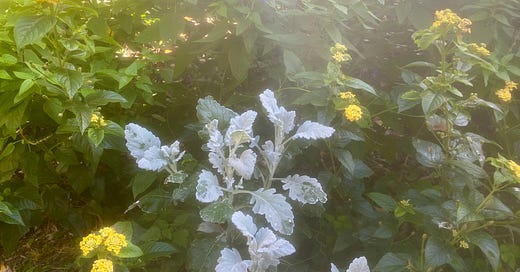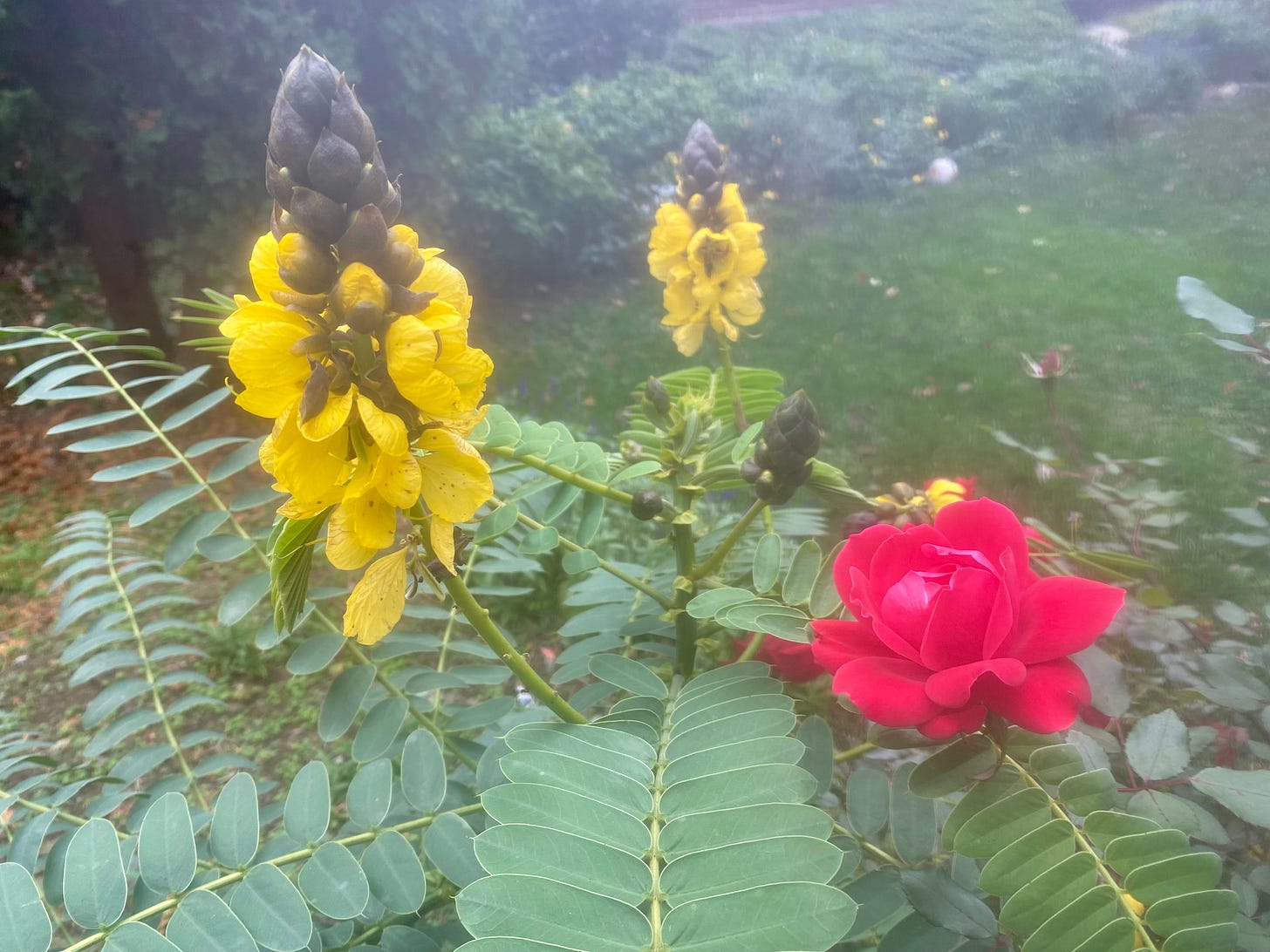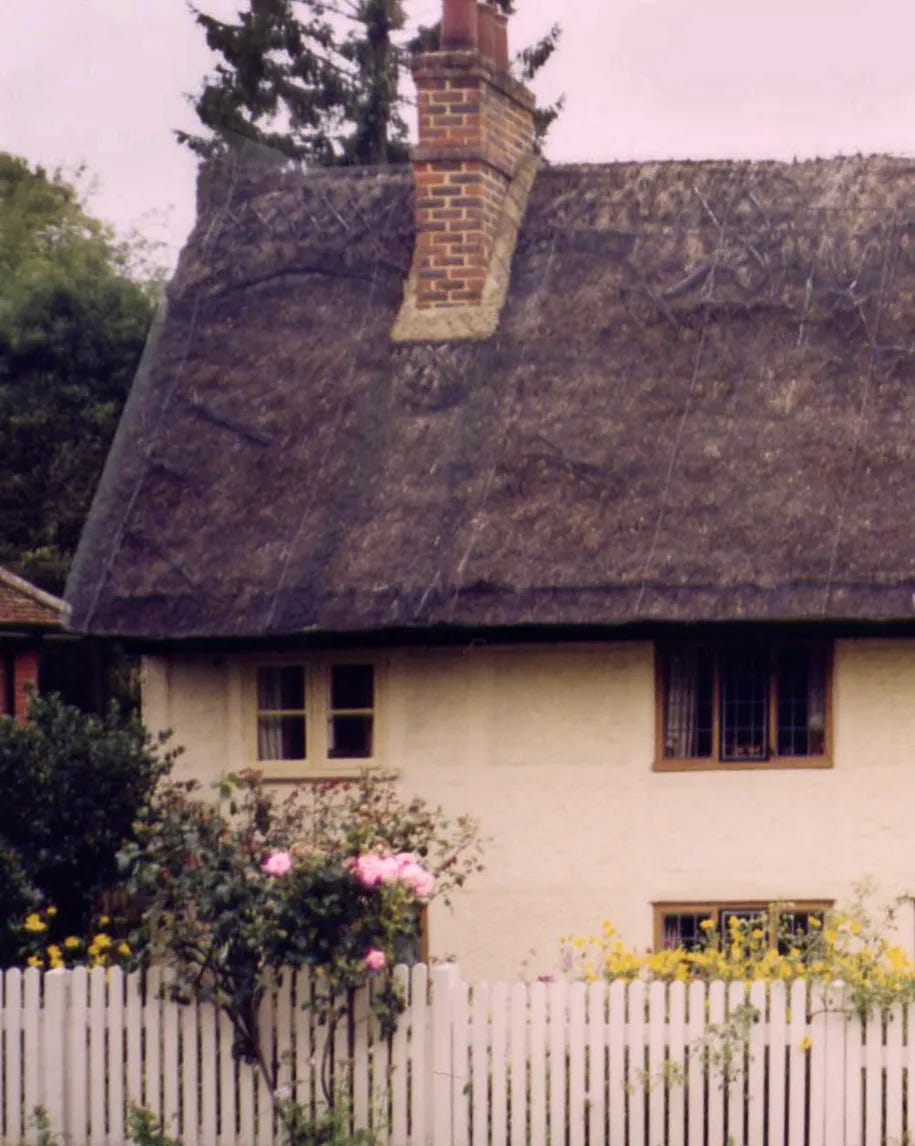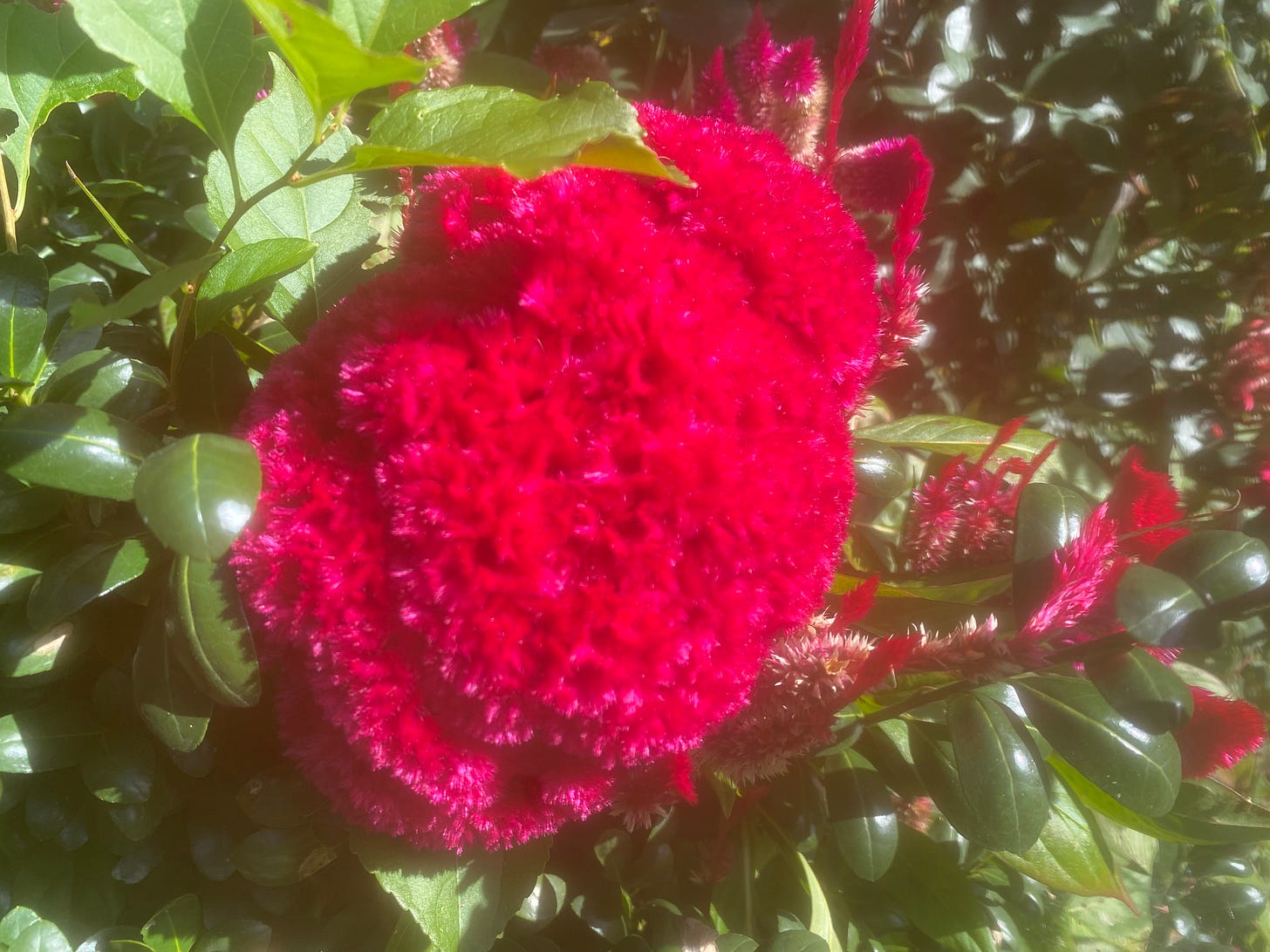This is the first of a new series of occasional posts I’m calling “scenes from the garden” in which I give attention to the simple joys around us by sharing photographs from our home and adventures, along with quotes from literature that I’m reading. I’m viewing these shorter posts of “scenes from the garden” as representative of anything that rejuvenates us.
To introduce the series, here are three reasons why scenes from the garden are important to topics like truth, justice, repair, and recovery.
Scenes from the garden promote recovery and healing.
Spending even just an hour in the garden is a rejuvenating experience for me and has played an important role in my own recovery and healing. I’ve found joy in experimenting with new ideas and discovering what new creations await. Every spring I look for some fun plants to include in our flower garden. One of my favorite annuals from this past season was our popcorn plant. It was standing over 6 feet tall before it blew over during a storm and now leans into our rose bush. Its leaves smell like buttered popcorn and close up tightly at night to conserve moisture.
If war has an opposite, gardens might sometimes be it, and people have found a particular kind of peace in forests, meadows, parks, and gardens.1
There is increasing evidence that exposure to plants and green space, and particularly to gardening, is beneficial to mental and physical health.2 There are many studies that show the numerous benefits of gardening. One found that simply viewing plants reduced stress, fear, anger and sadness, as well as reducing blood pressure, pulse rate and muscle tension.3
You don’t always have the capacity, opportunity, or access needed to enjoy the gardens of life whenever you’d like, especially if you are in the throes of an experience that overwhelms your time and energy. The hope is that you can find a way through the deserts, perhaps with the support of others, until you discover a place of rest and refreshment.
Scenes from the garden sustain you when engaging in difficult work.
I’m often asked what I do for self-care while engaging in this work. It’s a learning process, and some seasons are more challenging than others, but gardening is one of the responses I always give to that question.
I’ve been inspired by the biography of George Orwell, author of 1984, and how his passion for nature and gardening helped to sustain his writing. Rebecca Solnit authored Orwell’s Roses, a book that explores the connection between Orwell’s involvement with plants, particularly flowers, and his public writings about the dangers of totalitarianism and destructive leaders. Solnit helps us envision Orwell’s private life, one that included seemingly unimportant tasks like tending to the rose bushes at his cottage.
Solnit reflects on the questions evoked in her as she learned more about Orwell:
They were questions about who he was and who we were and where pleasure and beauty and hours with no quantifiable practical result fit into the life of someone, perhaps of anyone, who also cared about justice and truth and human rights and how to change the world.
Gleaning lessons from her exploration of Orwell’s life, Solnit describes how engaging in a hobby like gardening helps to rejuvenate you so that you can return to your work refreshed:
Walking or cooking or laboring on simple or receptive tasks can also be a way to leave the work behind so you can come back to it fresh or find unexpected points of entry into it.
Finding meaning and fulfillment in the simple joys of life can help sustain you in the midst of advancing important causes, speaking truth to power, and walking with the wounded.
A few years ago a neighbor gave us seeds from a celosia plant and now we have dozens of plants growing in our beds. They bloom later in the Summer and are a favorite of mine. I often stop to admire the different shades of color (purple, red, orange, yellow) and the various shapes of the flowers. Those little pauses can be small gifts throughout a challenging day.
Scenes from the garden remind you of what you are defending.
In a world of too much suffering, injustice, wars, and evil, we need reminders of what is good and beautiful and worth defending. When you get time to rest from the difficult work, returning to the garden helps widen your perspective by reminding you there is still good in the world. That reminder then serves as a motivating force when it’s time to reengage in the work, so that even when you are in the midst of battling injustice for the sake of others, you can look beyond the evil to see the light the darkness is trying to destroy, however dim that light might be.
The garden also brings hope for the future - hope that your efforts to defend what is good will not go to waste. In a piece titled Some Thoughts on the Common Toad, Orwell wrote:
I think that by retaining one’s childhood love of such things as trees, fishes, butterflies and – to return to my first instance – toads, one makes a peaceful and decent future a little more probable, and that by preaching the doctrine that nothing is to be admired except steel and concrete, one merely makes it a little surer that human beings will have no outlet for their surplus energy except in hatred and leader worship.
Sometimes the challenge is learning to see the beauty in what’s already there, even in the small and seemingly mundane. And we don’t need excess to experience the benefits of beauty and joy. Our attentiveness to the little scenes of the gardens around us is a better measure of our aliveness than the amount of our abundance.
Solnit, R. (2021). Orwell's roses . Viking.
Thompson R. (2018). Gardening for health: a regular dose of gardening. Clinical medicine (London, England), 18(3), 201–205. https://doi.org/10.7861/clinmedicine.18-3-201
Nakamura, R., & Fujii, E. (1990). Studies of the characteristics of the electroencephalogram when observing potted plants: Pelargonium hortorum “Sprinter Red” and Begonia evansiana. Technical Bulletin of the Faculty of Horticulture of Chiba University, 43(1), 177-183.









This is lovely and true. I so appreciate your references to finding beauty as a pattern of repair, healing and hope. Time in a garden is always a good idea for my soul. I have long loved this quote from a young mom, who said it often, after cancer handed her two wars and great suffering and a decimation of beautiful lives,
“Find a bit of beauty in the world today.
Share it. If you can’t find it, create it.
Some days this may be hard to do.
Persevere.”
Lisa Bonchek Adams
Wade, thanks for letting us heal a little by just seeing the photos of your garden. I know many therapists who specialize in abuse recovery who garden to help them handle the load. For me and Jason, our walks in our Bay Area neighborhood during the Spring when we were both fired from church led us to literally stop and smell the roses blooming in our neighbors’ gardens and admire the redwoods who grow tall and strong, withstanding the California fires over many years.
Orwell was on to something, and his work remains enlightening in today’s totalitarian spaces of all types.